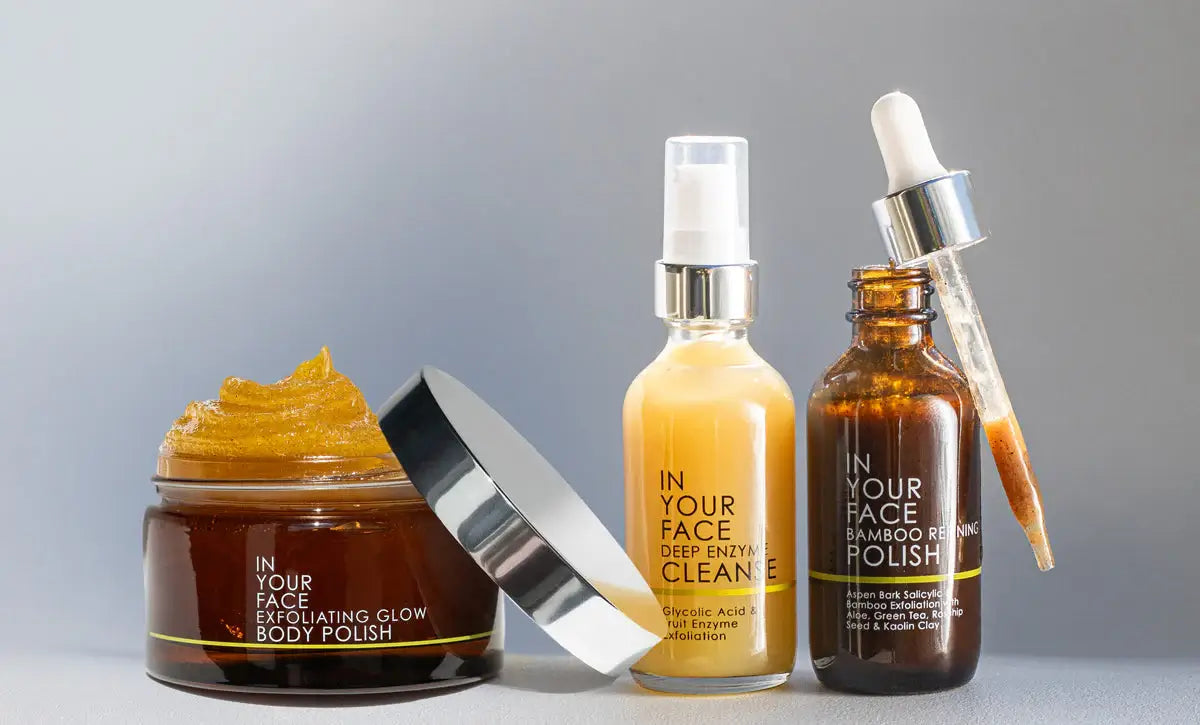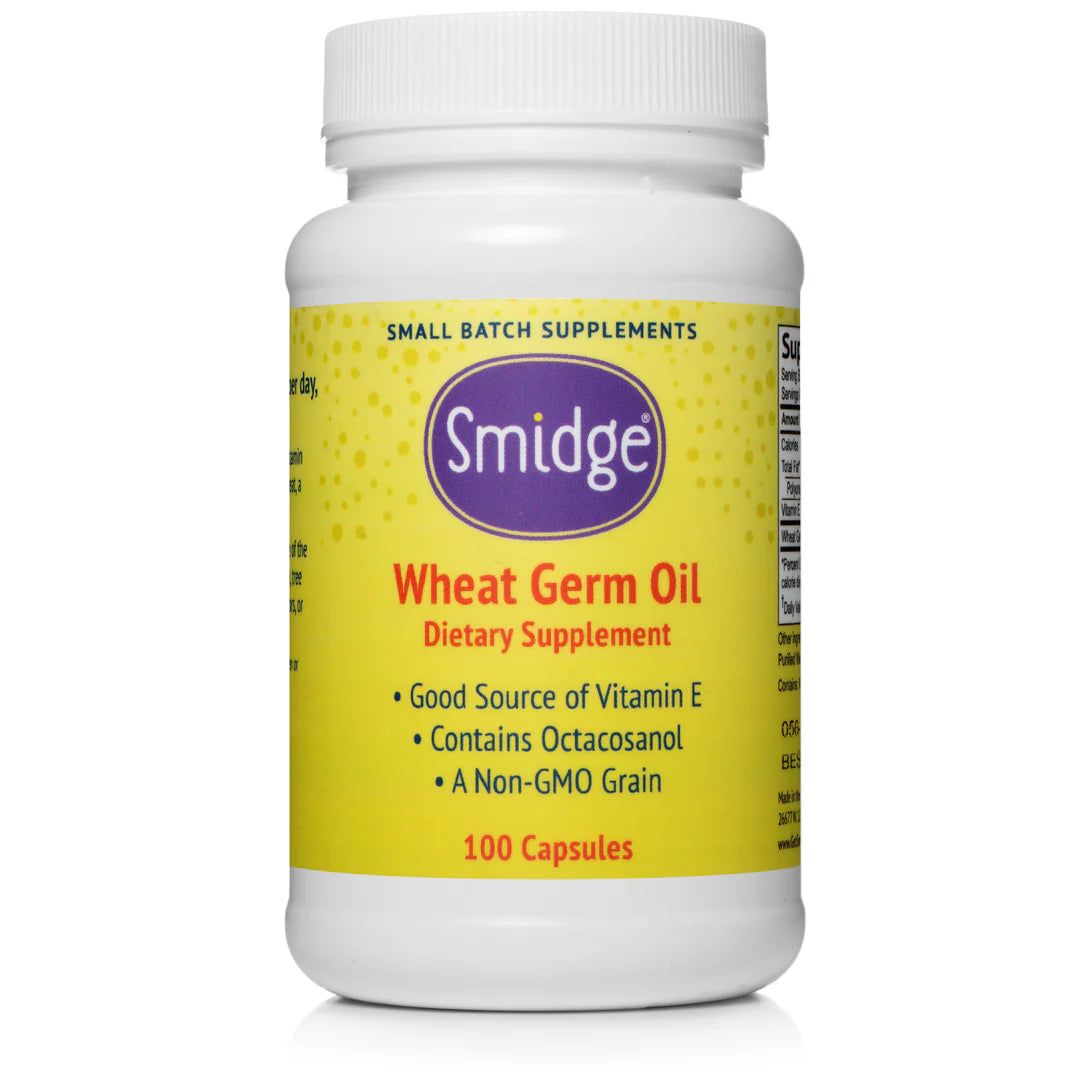
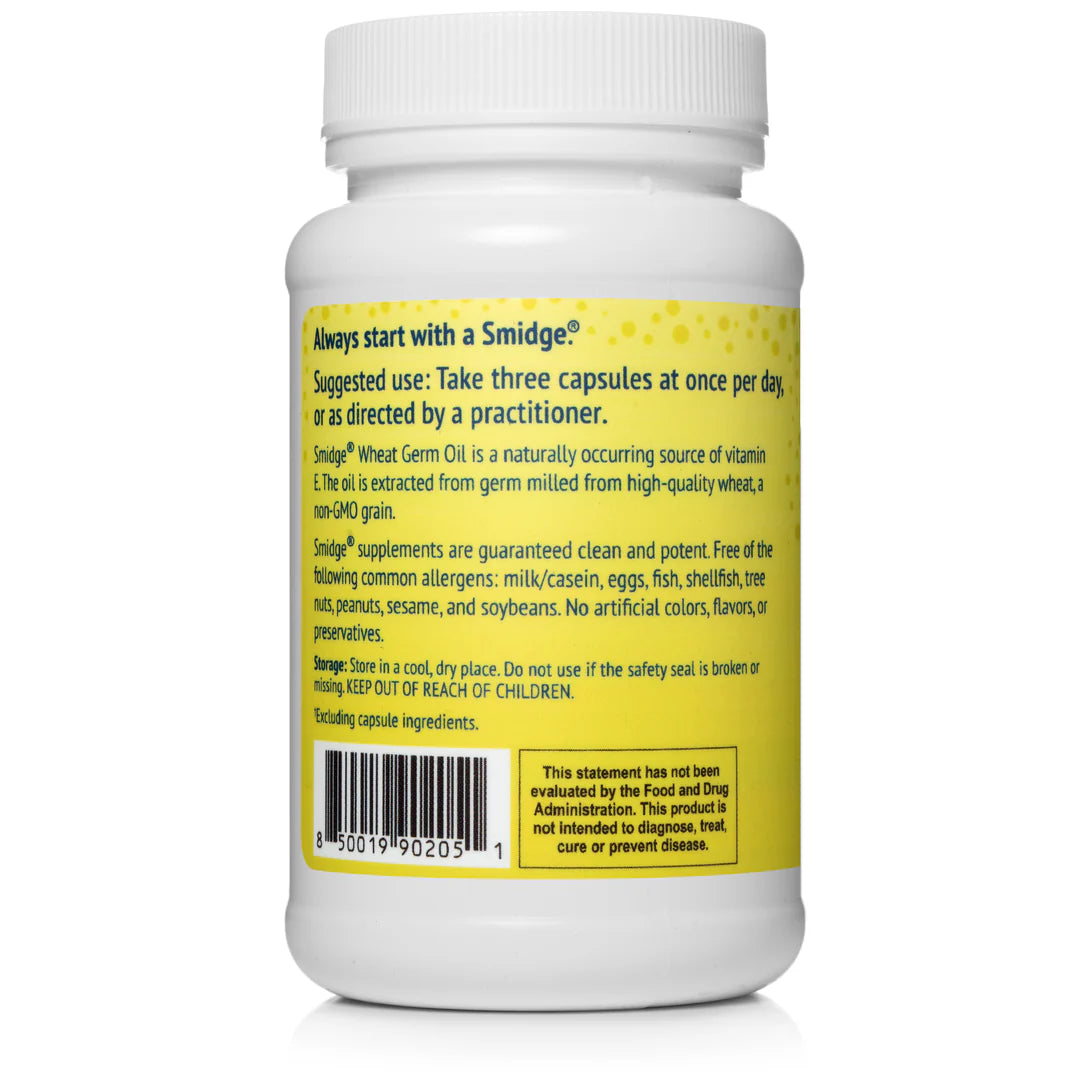
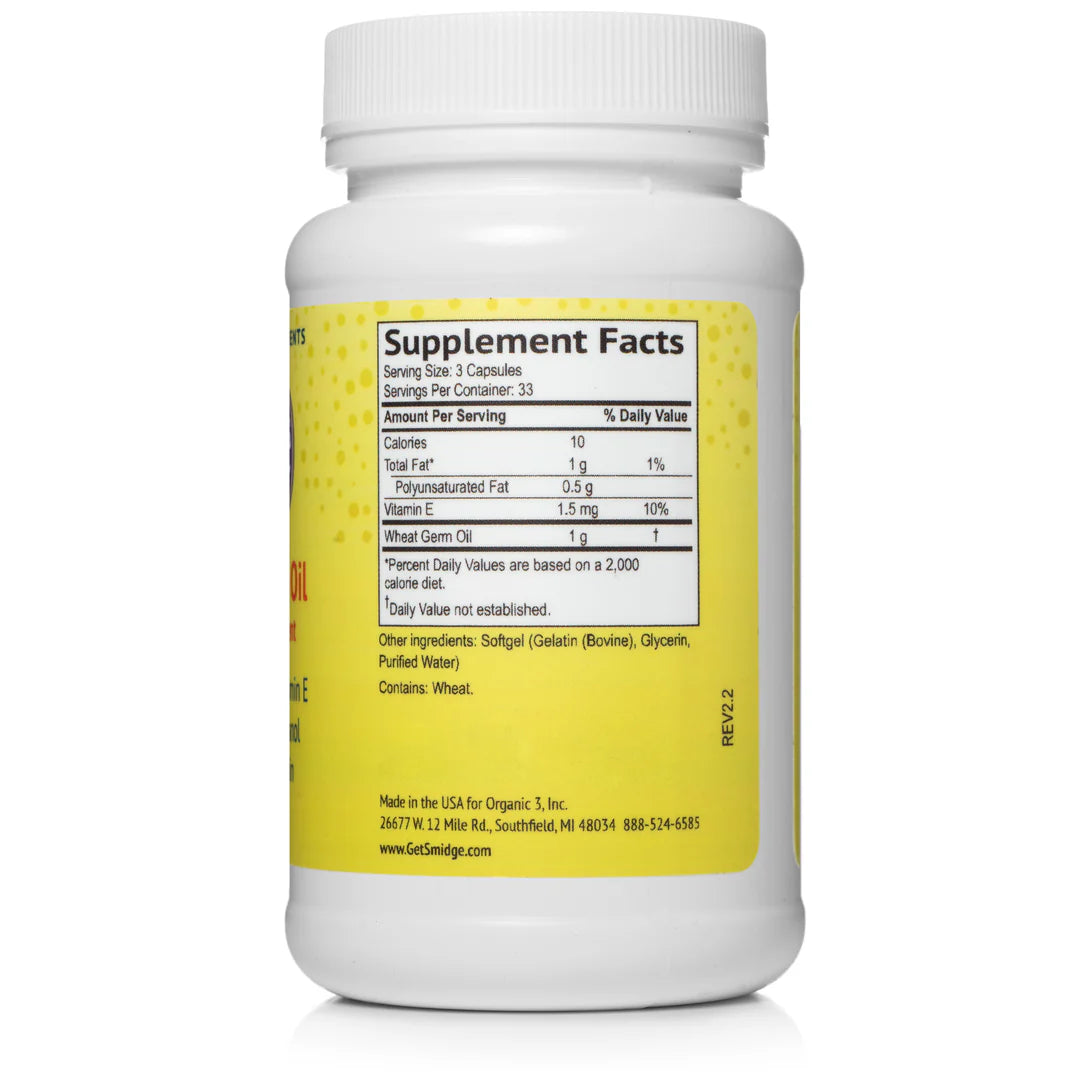
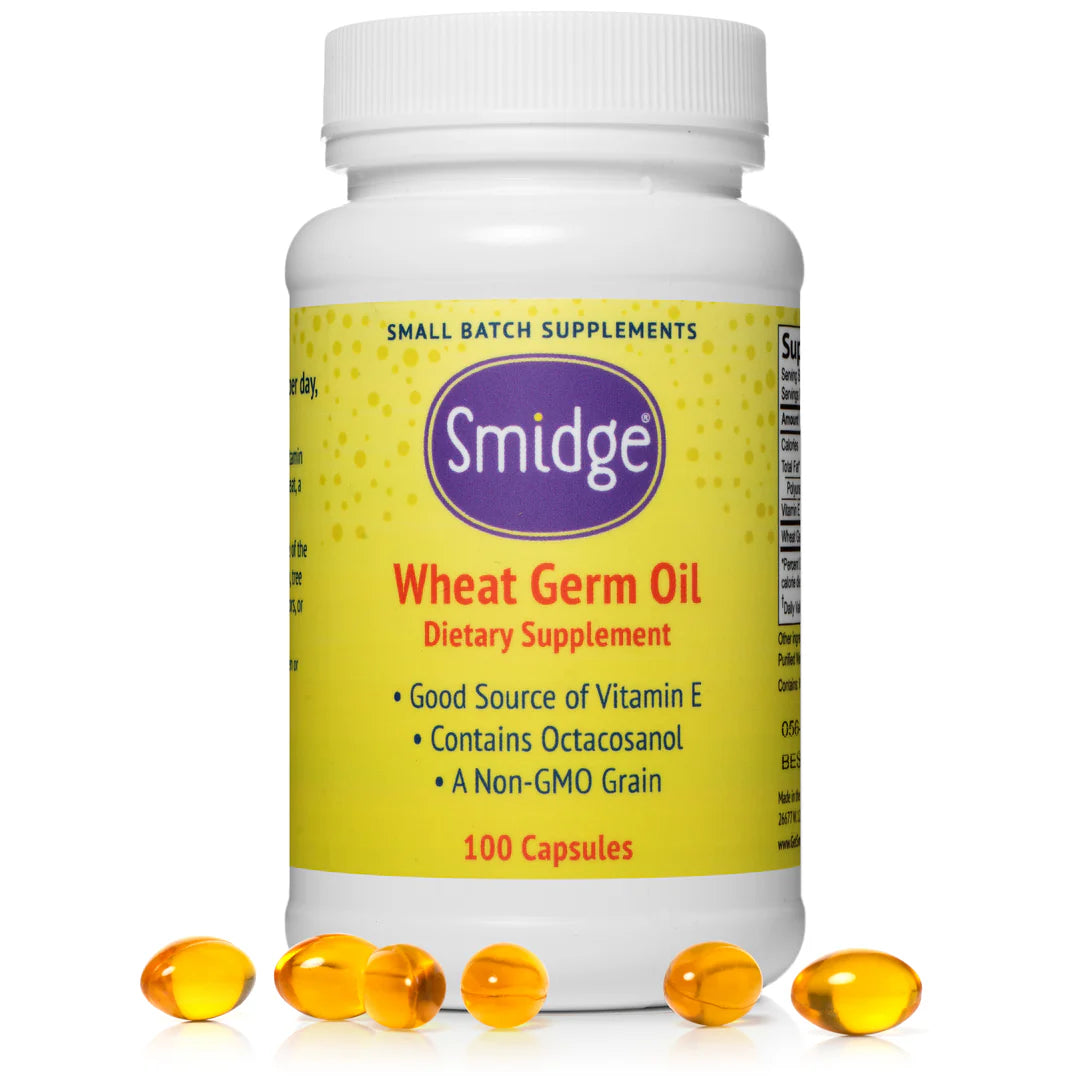
Smidge Wheat Germ Oil Softgels
Pure, full-spectrum vitamin E sourced from North American wheat germ
Experience a natural, food-based vitamin E supplement made with care. Smidge® Wheat Germ Oil Softgels are crafted from fresh, non-GMO North American wheat germ—the most potent natural source of vitamin E. Free from fillers and common allergens, this supplement delivers pure, nutrient-rich support.
Why Choose Smidge® Wheat Germ Oil?
Smidge® Wheat Germ Oil capsules provide a clean, whole-food source of vitamin E, straight from nature. Ounce for ounce, no other food offers a higher concentration of this essential nutrient.*
We extract our premium oil from the germ (seed embryo) of the wheat plant, ensuring maximum nutrient density. Sourced from the highest-quality, non-GMO North American wheat, our gentle, low-heat extraction method preserves the oil’s nutritional integrity. Made in small batches, this supplement contains no unnecessary additives—just pure vitamin E goodness.
Dosage Directions
Adults: Take three softgels at once per day with food, or as directed by a certified healthcare practitioner.
Children: Take 1 softgel daily, with food.
This supplement is not recommended for children under the age of 2.
This supplement is safe to take while Pregnant/Breastfeeding. Please be sure to reach out to your Certified Healthcare Professional about using supplements and their dosage while Pregnant or nursing.
How to take:
Smidge Wheat Germ Oil is best taken with food. You can take this at any time of day, with a meal. Take the full recommended dosage at one time.
Warning:
People taking blood-thinning drugs should avoid taking large doses of vitamin E. And, because Smidge Wheat Germ Oil is minimally processed to preserve the natural nutrients, the oil may contain trace amounts of gluten and should be avoided by those with celiac disease and severe wheat allergies. This product contains wheat.
Start Low and Slow:
Smidge® supplements are potent and pure. That’s why we recommend beginning with a lower dosage than suggested. You might start with a very small dose every other day or even just once a week. This approach helps you gauge how your body responds before increasing to the full dose.
Important Considerations & Warnings
- Blood-thinning medications: Those on blood thinners should avoid high doses of vitamin E.
- Gluten-sensitive individuals: Since our wheat germ oil is minimally processed to retain natural nutrients, it may contain trace amounts of gluten and should not be used by individuals with celiac disease or severe wheat allergies.
- Contains wheat.
Storage
To maintain freshness and potency, store in a cool, dry place, away from direct sunlight. Keep the included moisture pack inside the container to preserve quality.
Choose options




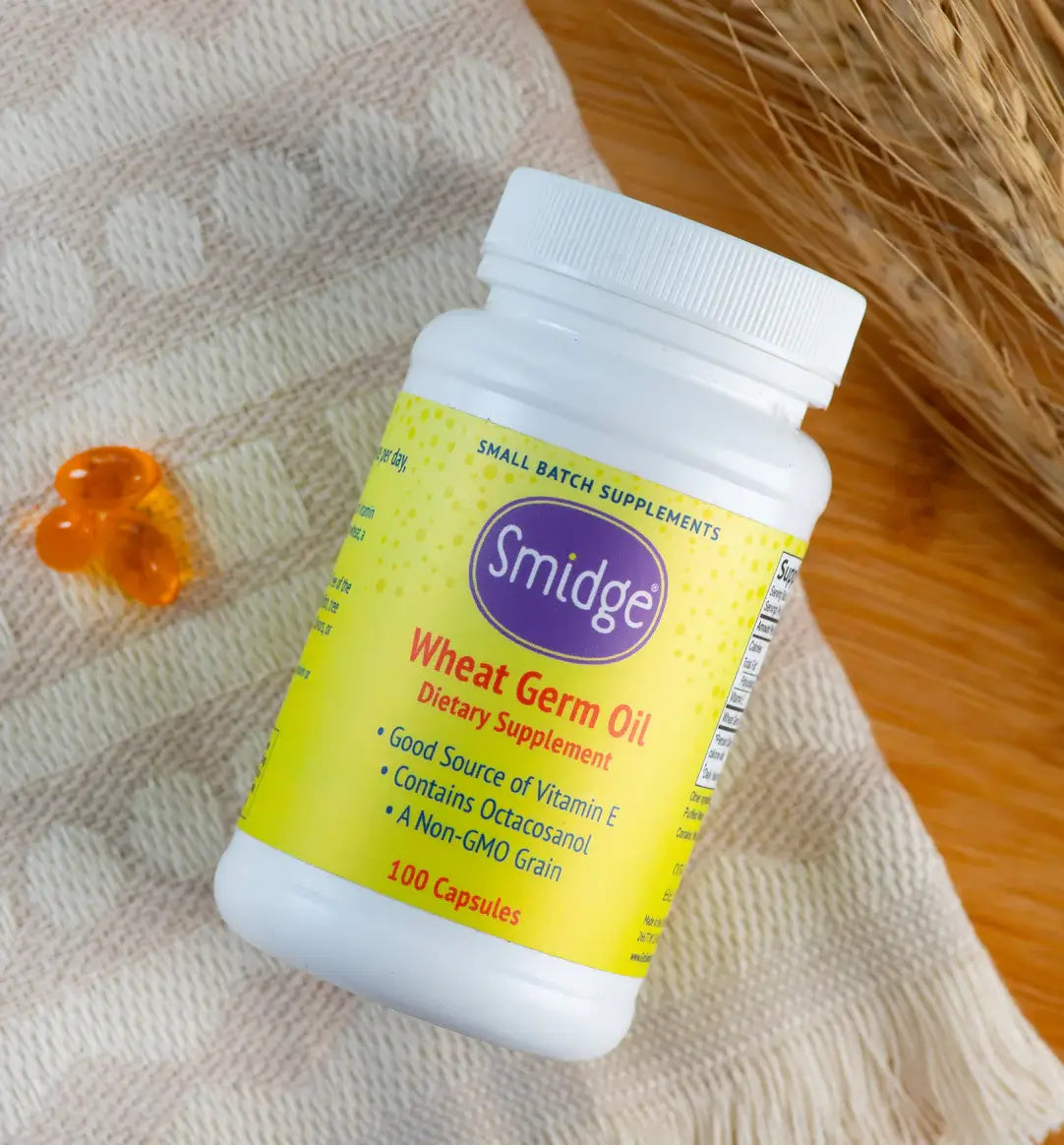
A clean, whole food vitamin E with natural cofactors
Because our Wheat Germ Oil is a whole food vitamin, it contains its inherent cofactors, including a full spectrum of tocopherols. So it maintains its original alpha-, beta-, gamma- and delta-tocopherols.
Our Wheat Germ Oil capsules are free of common allergens and fillers, so they’re kind to sensitive systems.

Wheat Germ Oil nutrients
Just a single serving Smidge® Wheat Germ Oil (3 softgels) provides your body with 1.5 mg of full spectrum vitamin E — 10% of your daily value.
Plus, you get additional beneficial nutrients like omega-3 fatty acids and phytosterols. It also has naturally occurring octacosanol, a nutrient that may help balance healthy blood pressure and boost exercise performance. *

Bioavailable, with more nutrients than vitamin E isolate
Smidge® Wheat Germ Oil is highly bioavailable, easily absorbed and provides more nutrients than an isolated vitamin E tocopherol supplement — as most are synthetic, highly processed or derived from soy.*
It’s real, simple food that the body recognizes and can use.*

Who takes Smidge® Wheat Germ oil?
Wheat germ is the embryo of the wheat plant, and it contains the highest amount of nutrients in the wheat kernel. This embryo eventually nourishes the new wheat plant, which is why it has so many vitamins and minerals.
That’s why folks looking for a pure, real food source of vitamin E love our Wheat Germ Oil capsules.
Wheat Germ Oil is part of the Root Cause Protocol by Morley Robbins, which seeks to address "the root cause" of health issues by rebalancing magnesium, copper and iron in the body.*
This supplement is also compatible with ancestral diets and protocols like keto and GAPS (Gut and Psychology Syndrome), as we source the oil from the embryo of the wheat plant, not the grain.* That’s why you can even take it on gluten-free diets.
What is in Smidge® Wheat Germ Oil Softgels?
Wheat germ is the wheat plant’s embryo, containing the highest amount of nutrients in the wheat kernel. This embryo eventually nourishes the new wheat plant, which is why it has so many vitamins and minerals. We source your pure Wheat Germ Oil from the freshest non-GMO wheat, grown in North America.
Gelatin from bovine, glycerin, purified water.
Need help?
Frequently Asked Questions
Wheat germ is the embryo of the wheat plant, and it contains the highest amount of nutrients in the wheat kernel. This embryo eventually nourishes the new wheat plant, which is why it has so many vitamins and minerals.
Yep. Smidge® Wheat Germ Oil does not contain milk/casein, eggs, fish, shellfish, peanuts, tree nuts, yeast, corn or soy.
It should be avoided if you have grain or wheat allergies, or celiac disease. Please note that this supplement does contain wheat.
Because Smidge® Wheat Germ Oil is minimally processed to preserve the natural nutrients, the oil may contain trace amounts of gluten and should be avoided by those with celiac disease and severe wheat allergies.*
You can take Smidge® Wheat Germ Oil while on a gluten-free diet, as it’s sourced from the embryo of the wheat plant and not the grain.* This product is also compatible with ancestral diets and protocols like keto and GAPS (Gut and Psychology Syndrome).*
Strictly speaking, the Paleo diet excludes all grains, including wheat. Wheat Germ Oil is a naturally occurring vitamin E supplement for those looking to get their vitamins from real foods. And it doesn’t contain any grains.
Yes. The good news is that all wheat in the United States, and any other country, is non-GMO! While many corn and bean crops are genetically modified, wheat is not.*
That’s one way to do it. But Smidge® Wheat Germ Oil is more efficient. It far exceeds the vitamin E content of all other foods. (See next question.)* No preparation is required and it’s easy to consume at home or away.
One tablespoon of wheat germ oil provides 15.9 mg of vitamin E. The next best food source, sunflower seeds, provides only 7.4 mg per ounce, while peanut butter comes in at a mere 2.9 mg in every 2 tablespoons. Please note that the serving size of Smidge® Wheat Germ Oil is just 3 softgels, as a little goes a long way.
The wheat in your oil is harvested in North America, and the final product is produced here, too!
Little known tidbit: most supplemental tocopherols are derived from soy, with the U.S. being the top crop producer. Soy is naturally high in gamma-tocopherol, so when alpha-tocopherol is required, as is typical for most multivitamins, manufacturers convert soy-derived gamma-tocopherol to alpha-tocopherol. This means that most alpha-tocopherol supplements are not natural, but at best, semi-synthetic. With the main advantage of synthetic vitamin E being low cost, its clinical use is desirable, partially because these forms are alien to the human body.*
There are two different types of vitamin E called isomers. Isomers are molecules with the same chemical formula but different chemical structures. The synthetic isomer of vitamin E is called Dl-alpha-tocopherol acetate, and it’s a byproduct of petrochemical-dependent manufacturing.*
There are several issues with synthetic vitamins and synthetic vitamin E. To start, they’re less effective and bioavailable than the natural forms you can get from food.* Further, the synthetic form of vitamin E can cause health issues in other parts of the body.*
The natural source of vitamin E is called D-alpha-tocopherol and is in wheat germ, seeds, nuts, spinach and many other whole foods.


